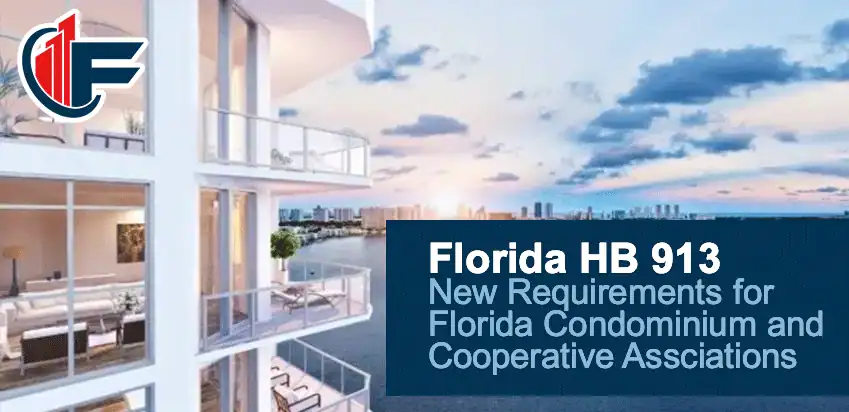-
HB 913, signed into law on June 22, 2025, extends the deadline for Structural Integrity Reserve Studies (SIRS) to December 31, 2025, from December 31, 2024, offering property managers more time to comply.
-
It allows a 2-year pause in reserve fund contributions to prioritize critical repairs, providing financial flexibility.
-
The replacement cost threshold for SIRS increases from $10,000 to $25,000, adjusted annually for inflation, focusing on major repairs.
-
Inspections now apply to buildings with three habitable stories or more, including four-family dwellings, clarifying compliance needs.
-
Property managers can use special assessments, lines of credit, or loans for reserves, and pool reserve accounts without unit owner votes, enhancing financial planning options.
-
FPAT offers expert, tailored reserve study services to help navigate these changes, ensuring compliance and peace of mind.
Key Changes for Property Managers
-
Extended SIRS Deadline: The deadline for completing Structural Integrity Reserve Studies (SIRS) is now December 31, 2025, giving property managers additional time to prepare.
-
Financial Flexibility: Associations can pause reserve fund contributions for up to two years to focus on critical repairs, easing financial pressures.
-
Higher Threshold for Repairs: The cost threshold for repairs in SIRS increases to $25,000 from $10,000, adjusted for inflation, prioritizing major maintenance.
-
Updated Inspection Rules: Inspections are required for buildings with three habitable stories or more, including four-family dwellings, clarifying which properties need assessments.
-
Alternative Funding Options: Property managers can use special assessments, lines of credit, or loans to fund reserves, offering more financial strategies.
-
Pooling Reserves: Reserve accounts can be pooled for multiple components without unit owner votes, simplifying fund management.
Why This Matters
How FPAT Can Assist
-
Customized reserve studies meeting SIRS requirements.
-
Guidance on compliance with the new deadline and inspection rules.
-
Support for financial planning, including alternative funding options.
-
Peace of mind with comprehensive, Florida-specific solutions.
As a dedicated board member or property manager for a Florida condo association, HOA, or commercial property, you’re the hero safeguarding community safety, financial health, and compliance amid relentless challenges like the Structural Integrity Reserve Study (SIRS) requirements. The problem? Insurance mandates, Florida’s stringent laws, and unpredictable hurricanes are intensifying the pressure, fueling worries about non-compliance, unexpected expenses, and unhappy stakeholders. It’s unjust to tackle this solo—you deserve a reliable partner to simplify it all.
Enter FPAT, Florida’s local experts in condo, HOA, and commercial reserve studies, serving the entire state of Florida, including key areas like Clearwater, Tampa, Orlando, Miami, The Villages, Sarasota, Naples, Jacksonville, Hialeah, Tallahassee, Fort Lauderdale, Port St. Lucie, Cape Coral, Gainesville, St. Petersburg, Pembroke Pines, Coral Springs, Lakeland, Miramar, and Boca Raton. We understand the overwhelm and deliver authority through years of supporting associations and commercial clients just like yours, navigating SIRS, traditional reserve studies, and Florida’s unique weather and regulatory hurdles—from bustling urban centers to coastal communities.
To strengthen your online visibility and attract more heroes seeking guidance, here’s an optimized metadata strategy for the page at https://fpat.com/understanding-sirs-reserve-requirements-in-florida-a-guide-for-condo-associations/. This setup enhances SEO, boosts traffic, and establishes the guide as a must-have resource—steering you clear of risks like fines or insufficient reserves toward triumph: seamless compliance, resilient properties, and lasting tranquility.
Background and Context
Detailed Provisions of HB 913
-
Extension of SIRS Deadline: The deadline for certain associations to complete their SIRS, previously set for December 31, 2024, has been extended to December 31, 2025. This extension, as noted in a recent article from the Tallahassee Democrat, provides immediate relief, allowing associations more time to prepare and conduct these critical studies. This is particularly beneficial for associations struggling with compliance timelines.
-
Pause in Reserve Fund Contributions: HB 913 allows associations to pause reserve fund contributions for up to two consecutive budget years if they have recently completed a milestone inspection and are focusing on repair obligations. This provision, detailed in a legal analysis from Bilzin Sumberg, aligns with the right to prioritize funding for critical repairs, offering financial flexibility during urgent maintenance needs.
-
Increase in Replacement Cost Threshold: The threshold for deferred maintenance expenses or replacement costs in SIRS has been raised from $10,000 to $25,000, with annual adjustments for inflation based on the Consumer Price Index. This change, as reported by the Herald-Tribune, ensures that associations focus on more significant repairs, potentially reducing the burden of smaller, less critical expenditures.
-
Changes to Inspection Requirements: Mandatory structural inspections now apply to buildings that are three habitable stories or more, rather than just three stories or more, and include four-family dwellings. This clarification, as outlined in the Governor’s press release, aims to exempt certain buildings like those with ground-floor parking, though inconsistencies in statutory language may confuse, as noted in legal analyses.
-
Alternative Funding Options: The law permits associations to use special assessments, lines of credit, or loans to fund maintenance reserves, as highlighted in multiple news sources. This flexibility is crucial for associations facing sudden financial strains, offering multiple avenues to secure necessary funds.
-
Pooling of Reserve Accounts: Associations can now pool reserve accounts for two or more required components without a vote from unit owners, simplifying fund management. This provision, detailed in the Florida House’s bill summary, enhances efficiency and aligns with modern financial planning practices.
Implications for Property Managers
FPAT’s Role in Navigating HB 913
-
Customized Reserve Studies: FPAT provides reserve studies that factor in Florida’s laws, weather risks, and HOA quirks, ensuring compliance with SIRS requirements. Their process, as detailed in the Brandscript, includes contacting FPAT, receiving a tailored proposal within 3-5 days, and delivering a rock-solid report that meets all regulatory needs FPAT Website.
-
Expert Guidance on Compliance: With local expertise, FPAT helps property managers navigate the extended deadline, inspection changes, and financial planning options. Their empathy and authority, as emphasized in the Brandscript, ensure they understand the stress of insurance demands and regulatory pressures, offering peace of mind.
-
Financial Planning Support: FPAT assists with developing financial plans that incorporate alternative funding options and reserve pooling, aligning with HB 913’s provisions. Their focus on delivering a compliant plan ready for storms and wear-and-tear ensures long-term community protection.
-
Peace of Mind: By leveraging FPAT’s services, property managers can transform from overwhelmed leaders to confident, in-control figures, as highlighted in the Brandscript’s character transformation. This includes securing respect and confidence from residents, knowing the property’s future is safeguarded.







